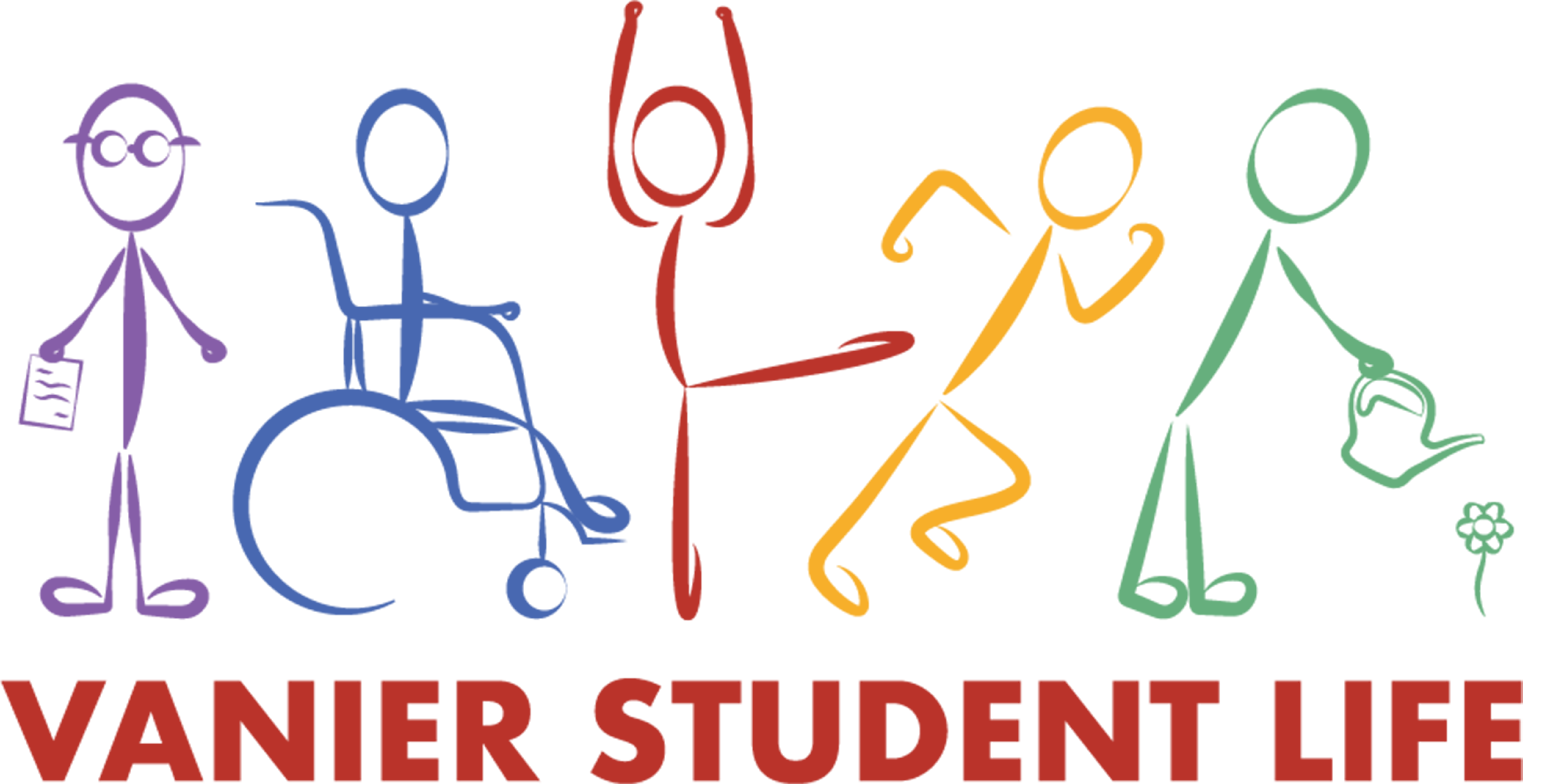In October 2020, the PSI office put out a call to individuals and services from across the college to share reflections and/or stories about how they have managed to teach, learn, and support one another through Covid times. We asked:
Thinking back on the last few months, what reflections or stories would you like to share with the Vanier community? What challenges have you encountered, whether in your own professional experience or in terms of challenges faced by students? What strategies have you used to address these challenges? What successes have you experienced? What have you learned about learning, teaching, advising, counselling, supporting, advocating (for self and others)…? How have the last months changed you as an educator?
The following is a collection of the testimonials received.
Teaching in Explorations – what our students taught us this past year
If anyone had told us years ago that we would be teaching Exploration courses online during a pandemic, we would have laughed at the thought! How could we reach our students–who really need extra help, college resources, and guidance–via Zoom or Teams?!
Once we dove into the deep-end of the online teaching world, the questions changed. How can what we’ve learned from our students benefit other students? And just as importantly, how could our learning benefit other teachers?
Being empathetic, understanding, caring, and flexible was our guiding philosophy.
As challenging as this past year has been for teachers, it has been just as challenging, if not more so, for the students. Under the guidance and mentorship of our coordinator Marie Gribbon, the Explorations department took our students’ feedback and came together to compile student approved online teaching methods to better support them. And now, we want to share our students’ wisdom with you.
Our students made it clear that they wanted their classes taught in real time. They said, “[I] want to see my teacher during class”; what they wanted was direct and frequent access to us. Consequently, during the winter semester, Explorations teachers changed all our classes to Synchronous or Blended formats. Students also said that they “miss[ed] being with [their] classmates.” To encourage them to participate, feel comfortable to ask questions, and make friends, several Explorations teachers asked students keep their cameras on during classes. We used break-out rooms to encourage small group discussions, and we took time during most classes to “check-in” with our students. Being empathetic, understanding, caring, and flexible was our guiding philosophy.
Students also told us that “having the teacher write notes on a board” was what they often preferred over reading documents or scrolling through slides on their own. Some teachers bought white boards at Dollarama and went “back to the drawing board.”
Almost every student told us that with multiple platforms, they would quickly lose track of “what needed to go where.” Consequently, we made every effort to minimise the number of platforms we used in Explorations courses. We saw that our students faced challenges simply trying to navigate through their first year of college online and at home, so keeping classes easy to access and assignments easy to submit was important for us.
Certain students mentioned that they “got lost with all the things to do in each class.” To help with organizational skills, some Explorations teachers MIO’d students every Sunday, reminding students of the assigned work they needed to accomplish for their week. (Recent student feedback informed us that those weekly communications really helped them stay on track!)
Many students mentioned that they “did not feel connected to Vanier.” To try to help them integrate better in their courses and at the College in general, some teachers invited their students to take part in various activities. Attending the Dance Workshop for International Women’s Week stands out for me as one of the greatest moments of my semester with my class! What a blast! Other teachers had their students work with peer mentors and even invited them to give mini class presentations to explain College resources and demonstrate that they were not alone even if they were learning, at home, alone.
Lastly, many students told us that they missed seeing their teachers face to face. From our perspective, we really did not get to know our students like in the olden days, when we were on campus. So on top of our regular office hours, quite a few teachers reached out to have one-on-one phone calls and video chats with our students: when we felt that they needed help with an academic or a non-academic issue, when we sensed, or they told us, that they were struggling with mental health issues and needed guidance to access the right College resource, or when they were falling behind and we were worried about them. These past 18 months, teaching students our courses’ content was important, of course, but being present for them was vital. We accomplished so much this year! We are proud of the ways we navigated teaching online during this pandemic, and we are very thankful to the students for helping us learn how to do it a little right-er. In Explorations, we did it as a team, which really does go to show that it takes a village!

Natalie Carlino
teaches in the Sociology and Explorations departments.
Vanier Student Life and Sustainability
Initially, the biggest challenge for the Student Life and Sustainability Team was how to offer engagement activities to students that would foster campus life and co-curricular learning in a virtual context. As the Fall semester unfolded, we recognized that students were grappling with having to continuously adapt to a multitude of changes, and it became clear that there was an urgent need to incorporate wellness activities into our programming.
[W]e recognized that students were grappling with having to continuously adapt to a multitude of changes…
We saw that many first-year students were struggling because they don’t have a strong sense of connection to the College community. In our experience, many returning students were better able to make the transition to online learning because they had existing connections to Vanier.
In order to address these concerns about student wellness, our first priority was to meet the students where they were. This meant shifting a lot of our activities to platforms like Discord, Instagram, and even TikTok. We also needed to find ways to use Zoom creatively to foster friendships and social activities for students. Despite it being challenging to adapt and revamp our programming, we have found that students are still participating and looking to make connections. We’ve had to think outside the box, which has been a fun, creative challenge. Knowing that we’re offering students activities that are helping them through this time is incredibly rewarding.
Want to know more? Like, follow, and subscribe to Vanier Student Life across social media! 🙂

Marya Grant
is a Student Life Advisor (Student Life, Sustainability, and Indigenous Students).

Kristen Whitelaw
is a Student Life Recreational Activities Technician.
Athletics
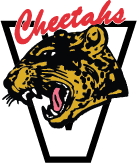
As the Fall 2020 semester began, our Athletics department members were extremely excited, yet cautious about how we would be able to continue offering physical activities and abide by all the different protocols set by each sport federation. Our biggest hurdle, which did not seem large at first, was setting up guidelines to allow over 100 student athletes to enter the Sports Complex at approximately 6:00 pm, when classes finished. After working on the guidelines, we put our plan into action. Players were to stay outside, two meters apart, and teams would enter at different intervals. What we didn’t anticipate was how much these student athletes missed the social interactions with their team mates. When they arrived on campus, they started two meters apart, but as if through magnetic forces, after several minutes, they would get closer to one another. After seeing this problem arise, we decided we would place cones at distances of two metres. We stationed a staff member outside every evening to ensure that students were respecting physical distancing rules. Not only did this help ensure proper distancing; it also allowed our student athletes to meet our staff and vice versa. We were able to communicate with students face to face, something that we had not previously been able to do due to Covid. Having the opportunity to meet with students face to face also gave us insight on how they were doing in school and how they were enjoying their sport.
A Covid hurdle became a Covid blessing, an opportunity to socially interact and assist our student athletes at a different level; something both our staff and students very much appreciated.
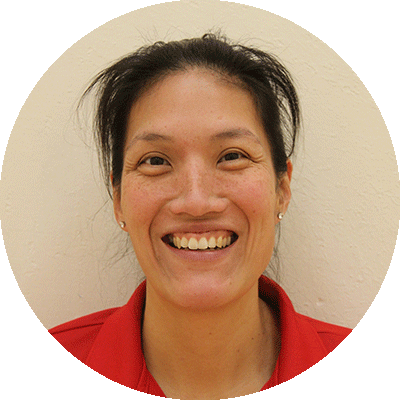
Mai Nguyen
is a Student Life Advisor (Athletics).
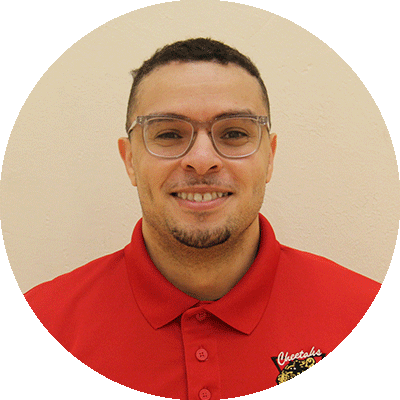
Mark Lachapelle
is a Recreational Technician for the Vanier Athletics Department.

François René
is a Recreational Technician for Vanier’s Aquatic program and Head Coach of the Women’s Basketball Division 1 Team.

Helena Bastos
is a Recreational Technician for the Vanier Athletics Department.
Code of Conduct Office
After moving to distance learning in March 2020, we were curious how the role of the Office of the Code of Conduct would continue to contribute to the Vanier College community. Previously, the majority of situations we responded to occurred on Vanier College’s campus.
Soon after, we realized that there were most certainly situations to respond to and manage, but they were occurring within a new context. Now, with almost all school activities occurring online, it meant that violations to the Code of Conduct could almost only happen within the online class domain.
The new circumstances created a new issue for our office to respond to, that being Zoombombing. The first of such cases presented itself to us in April, and there have been a number since. These acts of Zoombombing have gone from involving somewhat silly and strange antics by students, to more severe situations where there have been acts of racism, cyberbullying, targeted harassment, and persistent disruptions of the same courses.
This has required us to liaise with other departments in the College, such as Pedagogical Support and Innovation, to develop resources and information for teachers to best understand how to protect their classes from intruders and support their students in the event of a Zoombombing incident.
Since March, we have only met with students via phone or online, and we have not held any meetings in person. This has been a significant change to the way we normally operate, but in some ways it has also made things simpler. Within those virtual meetings, we have had to be mindful of the difficulties the current situation can pose for students, particularly because it is harder to pick up on cues indicating their emotional state.
Through our interventions, we are supporting students and helping them make a distinction between their academic online environment and their personal online environment. This distinction has been observed as a potential cause for some of the problems that have presented themselves to our office. Students have broadly been receptive to the coaching offered in these circumstances.
Behind every student number, behind every screen, behind every assignment is a student; each life sporting its own unique experiences and challenges. Toggling between on campus and online presence has truly accentuated the importance of listening, fact checking while drawing from many facets of “truth,” and creating opportunities for learning and growth.
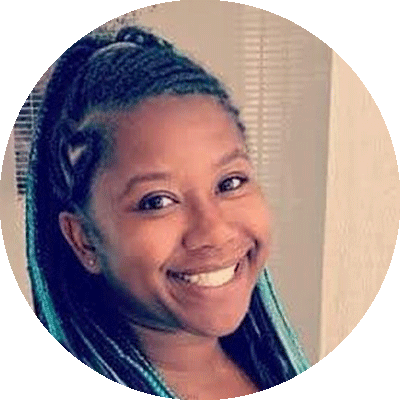
Shera Robinson
is a Social Service Officer in the Office of the Code of Conduct in Student Services.

Matt Shaw
is a Social Service Officer with the Office of the Code of Conduct and the Student Advocacy Office.
Access Centre
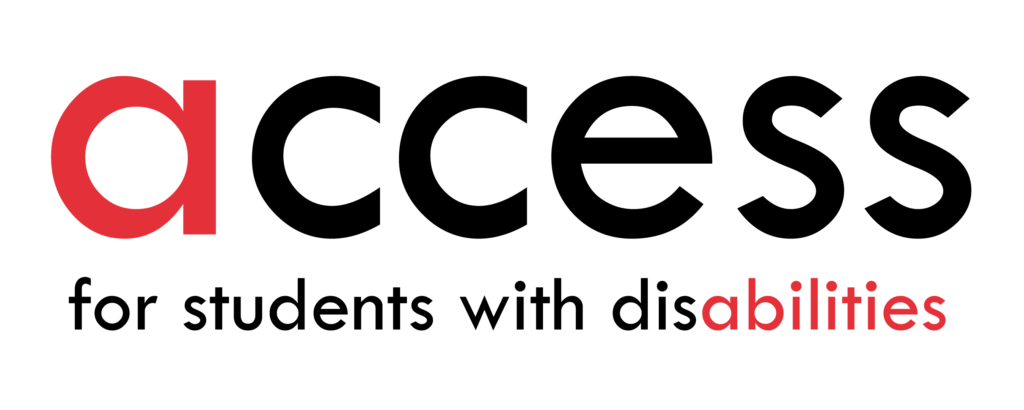
As of March 15, 2020, the lives of every member of the Vanier community changed drastically. In response, the Access Centre scrambled to identify barriers and seek evidence-based approaches to accommodate students in the online learning environment. Since moving online, Access has been attending ongoing professional development seminars, working to educate ourselves on the various platforms used in online learning, integrating accessibility features and communicating our knowledge to students through info docs, visual posters, and YouTube videos.
We tend to get lost in the business of our work and the immediacy of ongoing student issues, sometimes forgetting to recognize the student success stories that are present amidst the pandemic. Although online learning is not for everyone, it has opened doors to learning for students who have otherwise been unable to leave their homes for health reasons. The Access Centre’s numbers increased significantly this year, not only because of the amplified need for services due to pandemic-related issues, but also because some students were finally able to access Vanier. Students who were previously unable to engage in on-campus activities due to immune system disorders or phobias had the opportunity to attend online classes. Many of these students are having the opportunity to try out Vanier College life for the first time. Others have been able to return to Vanier following a health crisis that previously made coming to campus impossible. These students, many of whom have dreamt about attending college, wearing a Cheetah’s hat or a big red Vanier hoodie, finally have that opportunity and are thriving.

Melissa Azevedo
is a Special Education Technician with the Access for Students with Disabilities office.

Shana Stafiej
is an Adapted Services Counsellor with the Access for Students with Disabilities office.

Kelly Mullaly
is an Adapted Services Counsellor with the Access for Students with Disabilities office.

Martine Roy
is an Adapted Services Counsellor with the Access for Students with Disabilities office.

Elizabeth Kafenzakis
was previously an Adapted Services Counsellor in the Access Services office; she now works as a Student Success Advisor in TASC.
Academic Advising
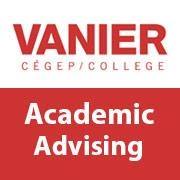
Working from Home
Part One
The ukase was issued, the College was closing. Staff would be provided with laptop computers and would work from home until otherwise advised.
We took our bibles – the binders that contain information about Vanier programs, equivalences and substitutions, past summer school offerings, university contacts, university calendars, university admission cut-offs – and off we went.
In the case of yours truly, who had never used a laptop before, I immediately experienced that queasy feeling in my belly that here was a new technological challenge I would probably have difficulty overcoming.
But overcome it I did, and relatively quickly. And the next thing I knew, I was into it.
As were all of us Advisors—seamlessly.
Part Two
I speak for all of us when I say that it used to be that we would occasionally have some down time. Down time, what’s that?
First of all, there is no such thing as a clear-cut weekend or continuous summer holiday anymore, since we are now connected to our work 24/7 and if, for example, we contacted our allocated group of students after registration in June and pointed out problems they were going to run into, how could we not check our email in mid-July to see whether the students had responded?
Second, we had to put more information online. This put pressure on the two members of our team who are most gifted in this area. As this kind of pressure never lets up, there is always something new to do, something more that has to be put online, e.g., more information about intersession courses on our website and continuous updating of university information on Omnivox.
Third, and most significant of all, I think, it takes a lot less time to answer a student verbally than in writing. As a result, writing out explanations to students takes longer. And as you write, you think of more pitfalls facing the student that they cannot possibly foresee, so you write even more.
So, no, we do not have to travel to and from work, but the queries don’t stop coming, and our replies do not stop having to go out.
Part Three
To sum up, our job is to provide information to our students about this thing called CEGEP and the many minutiae of which its programs are composed.
That’s our forte, but that’s not all we do, of course. Along the way, we help students cope with the demands of their program of study, help them change direction if that’s what they decide they want to do, find ways to mitigate the unusual difficulties some of them encounter, and provide them with the information they need to continue their studies, which the majority of our pre-university and many career students do. It is not for naught that the Academic Advising team adopted the motto get informed, become empowered.

Debora Resnick
is an Academic Advisor.
Learning Commons
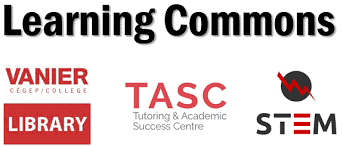
A Mainly Virtual Reality
Like most activities at Vanier, those of the Learning Commons were severely affected when the pandemic hit in March 2020. Originally developed for personalized face-to-face contact and community-building with students, most Learning Commons services had to be reinvented when we pivoted to online learning. By the time I arrived as the new coordinator in late August, it was evident that months of trial and error, diligent preparation, and inventive adaptation by the Learning Commons team had paid off.
While we will surely embrace the opportunity to see students back on campus (not to mention seeing each other), we will not abandon the lessons and techniques learned over this past year.
In accordance with government measures announced in October 2020, the Library has been open to students as a place to study for much of the 2020-21 academic year. Laptops can be borrowed for the day, as can books and other library materials when reserved in advance. In addition, a multitude of resources and services are available online including e-books, databases, films, and direct assistance from librarians through chat, email, and online class sessions.
As in previous years, the Science, Technology, Engineering and Mathematics (STEM) Centre coordinates both one-on-one and drop-in peer tutoring in math and sciences, though now sessions are held online. Review sessions offered on Teams by teachers are enjoying a popularity that eclipses the in-person sessions offered in the past. Activities like the Robotics Club and the Makerspace continue in a more limited capacity, and LaunchBox has embarked on another year of innovation.
The Tutoring and Academic Success Centre (TASC) has also adapted its services to the current context, taking all its services online. One activity that did not require modification was the massive endeavour of telephoning every new student to touch base and answer questions, as was also done in September 2019. Despite a change in format, meetings with students flagged by early alerts and mid-term assessment outreach are conducted according to the schedule established for several years now. Professionals from TASC and STEM have created online tutorials and videos to help students use Teams and other applications. Peer tutoring in English continues to be popular among students, as is peer mentoring. Thanks to the participation of several devoted teachers, the Writing Centre maintains its commitment to helping students write better. Finally, workshops on cheating and plagiarism are provided to classes at the request of teachers, and to meet growing demand, an online resource is being developed on the topic.
What will happen when things return to normal? While we will surely embrace the opportunity to see students back on campus (not to mention seeing each other), we will not abandon the lessons and techniques learned over this past year. For example, we discovered that the whiteboard in Teams is a boon to peer tutoring. We have learned that some students and needs are actually better served online, and the flexibility of such services will no doubt make them a permanent addition to the Learning Commons toolkit. While we did not choose to embark on this adventure, we cannot regret having learned new ways to serve students.
Caroline’s first day
August 24, 2020 was my first day of work at Vanier College. As I was early to my 9 a.m. meeting, I wandered the halls to pass the time, trying to get a feel for the place. Everyone was wearing masks and searching for places they needed to be. A couple of unlucky students asked me for directions. I eventually came upon the Learning Commons, where, as its new coordinator, I would be spending most of my time. Through the glass wall, it looked as crisp and bright as it did in the photographs I had studied when preparing for my interview for the job. It was like visiting the set of a film I had watched many times.
I bumped into new colleagues who recognized me before I did them, as we had only previously met online. Gradually, real people and places replaced the abstract images I had formed in my head. I have since come to see Vanier as a town, where citizens are welcoming and invested in getting along with each other over the long haul. I like it here. Still, my indifferent computer screen mediates most of my experience of work, and masked discussions in hallways are a rare delight. I look forward to the bustle and chaos of students making their way to class, to serendipitous chats with colleagues, and to knowing if someone has eaten a lot of garlic in their lunch. I will then say I’ve truly arrived.

Caroline Fodor
is Coordinator of the Learning Commons.
PSI
Friday the 13th of March, 2020 will forever be seared in the minds of the PSI team. It was the day that we received official notice of the College’s impending closure, for which we’d been feverishly preparing for two days. What we didn’t know at that time was that our preparations (and our readjustments, and the preparation of new initiatives, and more readjustments…) had scarcely begun.
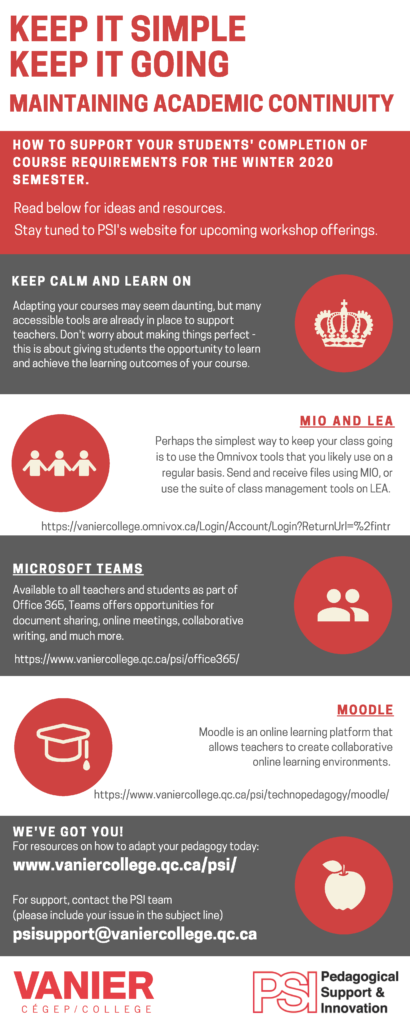
When we first learned that the college’s doors would likely be closing for two weeks, we abruptly dropped all of our projects and scrambled into PSI’s minuscule meeting room for a team huddle. (A huddle? How times have changed…) We asked ourselves, How can we best support teachers in making the transition to remote teaching? Over the next 48 hours, we brainstormed, researched, compiled resources, set up a new team email address, and created a poster emblazoned with the words, “Keep It Simple, Keep It Going.” It was a rudimentary stab at support for academic continuity at a time when our world was just starting to tip upside down, but we uploaded the poster and the new contact info to our webpage, which would become a hub for resources and communications to teachers over the following months. It was a messy hub for some time, but we used it to offer support to Vanier’s teachers as best we could.
Over the next few months, our team and many teacher collaborators offered workshops on a range of topics, from LEA and MIO to videoconferencing on Teams and Zoom to building quizzes on Moodle, using Microsoft Forms, narrating PowerPoints, ensuring equity and accessibility in online learning, and many more topics. We recorded the sessions and made videos available on our webpage. We started offering regular drop-in sessions called Coffee and Questions to provide technopedagogical support. Impromptu Q&A sessions in the Microsoft Teams page garnered a lot of active participation. We collaborated with Student Services to offer workshops on Zoombombing, and in collaboration with RespectWorks, we hosted discussion circles where folks could freely share their feelings about the challenges of teaching and supporting students online. In many cases, we heard about the heartache and headache of trying to teach while juggling the care of loved ones or facing down sudden isolation, not to mention fear and anxiety. Members of our team empathized with the feelings shared, as we too were lonely and/or scared and/or struggling to provide adequate care to dependents of our own, who were often jockeying for our attention during work hours (and sitting on our laps, yanking on our headphones) during meetings.
In April, the decision was made to put the publication of an August 2020 edition of Vanier Academic Voices on hold, and several members of our team pivoted our creative energies to the development of an online learning toolkit called Teaching and Learning in Uncertain Times. In June, with the help of collaborators from across the college, we launched an extensive set of tools to support teachers in their planning for fall courses, and we hosted a week’s worth of professional development activities as well as opportunities for collegial support and sharing.
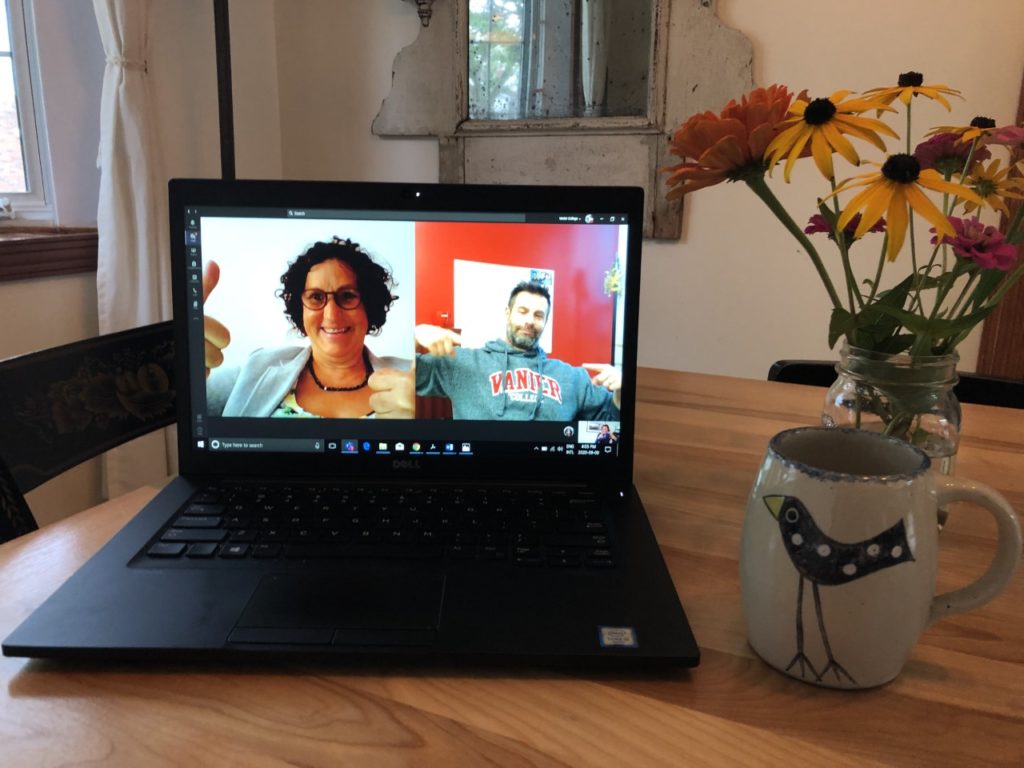
Since August 2020, we’ve continued striving to offer relevant support to Vanier’s teachers. Our webpage has been updated extensively; we are continually adding resources and working to make PSI’s webpage easier to navigate. In addition to our work supporting academic programs in achieving the objectives outlined in their annual work plans, we have offered a host of workshops on digital teaching, including interactive sessions about Moodle. In January 2021, we collaborated with pedagogical counsellors from across the English-speaking CEGEP network to offer the first-ever Intercollegiate Ped Days event. Among the most appreciated intercollegiate sessions were discipline-specific sessions that brought teachers from similar programs together to talk about course design, assessment, and student engagement in their field. In May, we launched a series of workshops to support teachers’ adaptation to blended learning opportunities using new technologies acquired by the College, such as the Meeting Owl Pro camera.
The shape and texture of teaching and learning have been shifty this past year, presenting new puzzles to the Vanier community and challenging us to bring unforeseen levels of creativity and adaptability to our work. As yet another transition materializes before us, we’re looking forward to continuing to support teachers after a well-deserved summer break. Though 2020 and 2021 have been incredibly challenging, it has also been an honour to collaborate with and offer support to dedicated individuals and groups across the College. From a place of exhaustion and exhilaration, but most of all in a spirit of appreciation, the PSI team celebrates you all.
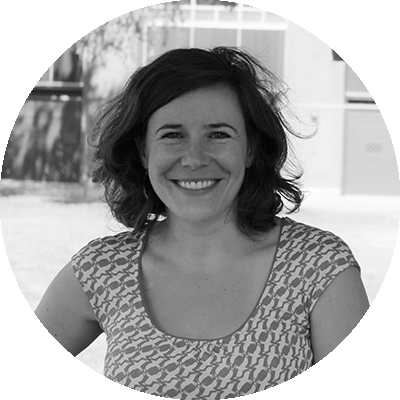
Julia Hall
is a Pedagogical Counsellor in the Pedagogical Support and Innovation office.


